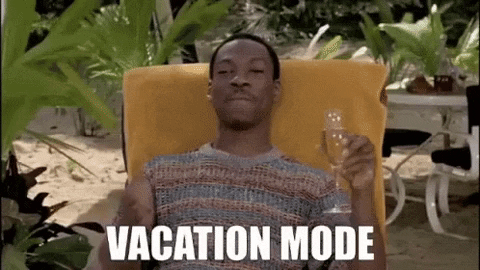Make your weekend more like vacation
Plus: Hooked on Wordle? Here’s another game to help you de-stress
“Hopelessness is a luxury. It's not an option for the people who are working hardest in this space. Because hopelessness is the end of the work and we're just at the beginning.”
-Phillip Atiba Goff
Vacation mode activated. You know that blissed-out feeling you have when you get back from a really epic vacation? There may be a way to tap into that more often. In a study published in Social Psychological and Personality Science, researchers gave workers one of two simple prompts on a Friday afternoon. One group was instructed to treat the weekend like a regular weekend. Another group was prompted to treat the weekend like a vacation. When workers returned to the office on Monday, the researchers asked them how happy they were. Not only was the vacation group happier than the regular group, but they were also better able to focus on the present moment during the weekend. They spent less time on chores and enjoyed their weekend more. The researchers wrote, “the study results suggest that treating the weekend like a vacation can increase happiness, and exploratory analyses show support for the underlying role of increased attention to the present moment.” Of course, not everyone has the luxury of a full weekend — or a weekend without chores. But perhaps it’s worth asking: What are small ways to make the weekend feel a little more like a vacation?
Move over, Wordle. You can play Tetris for free online, and here’s a reason to consider doing so: it may help reduce stress. Over at WIRED, writer Nikki Campo makes the case for revisiting this favorite childhood game as an adult. “When the pandemic and an onslaught of worry and anxiety hit, I doomscrolled, tossed and turned, and shouted at my kids more often than I should have,” Campo writes. “Much as I wanted to, I couldn’t get a grip on my emotions. I tried organizing closets to distract myself. Eventually, there were no more shirts to arrange by color, no more too-small hoodies to load into the donation tub. I needed another outlet.” That outlet? Tetris. It engages you in an activity akin to flow state: getting lost in a task that is both challenging and satisfying (like when that straight blue block lands juuuust when you need it). When we’re stressed or anxious, our cognitive resources are limited. In a way, playing games helps us hit the reset button. As Campo puts it, “Tetris provided a reliable way for me to get out of my head. After a game, I had fewer arguments with my family. I felt less agitated.”
Most of us think the best way to win people over is to push harder. But there may be a more effective approach: focus on the invisible obstacles to new ideas. Listen to learn more.
ON THE HIDDEN BRAIN PODCAST
Jan 10: Some of our most pressing social issues seem intractable. This week, we talk to psychologist Phillip Atiba Goff, who studies the relationship between race and policing. He says there are solutions that both police and the public can get behind.
Jan 17: A desire to be understood, to be seen for who we are, is a powerful driver of successful relationships. So why do so many of us regularly keep our true selves hidden?
ON THE MY UNSUNG HERO PODCAST
Jan 13: This week on My Unsung Hero, a story from Washington Post columnist Carolyn Hax. Some years ago, when her mom was dying, a distant colleague noticed her struggling at work, and gently reached out to help.
Don’t forget to send us the story of your unsung hero! Record a voice memo on your phone and email it to myunsunghero@hiddenbrain.org.
A NOTE FROM THIS WEEK’S SPONSOR
frank 2022. A gathering for social change communicators.
Join other changemakers working on the forefront of today's most pressing issues to explore how stories have the power to influence the issues you care about most. Happening online—frank is a gathering of communicators, scholars, and activists building the world we wish existed. bit.ly/3IMczJT
MIND GAMES
There are two ducks in front of a duck, two ducks behind a duck, and a duck in the middle. How many ducks are there?
LAST WEEK’S PUZZLE
Sam’s mother had four children. The first one was named May. The second and third were called June and July, respectively. What was the fourth child’s name?
The answer: SAM
FROM THE TWITTERATI…
A MOMENT OF JOY
The story behind the gorilla suit in space.
Have an idea for Hidden Brain? A story you want to share with us? Send an email to ideas@hiddenbrain.org. And if you’d like to support our work, you can do so here. Listen to us on Spotify, Apple, Amazon Music or your favorite podcast platform.







